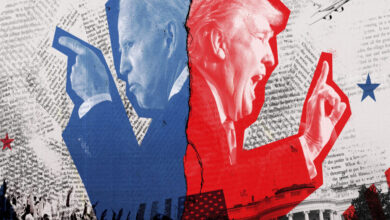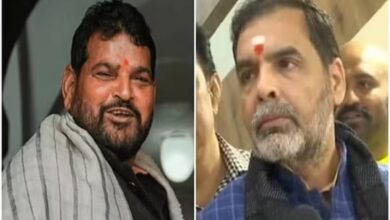Genocide in Manipur- Haven’t we seen all this before during 2002 Gujarat Riots?
Archbishop Joseph Pamplany calls Manipur violence genocide against Christians and compared it to the situation in Gujarat during 2002 riots.

Genocide against Christians?
The Syro-Malabar Catholic Church, which is located in Kerala, has strongly condemned the ongoing violence in Manipur and accused the government of ignoring what they refer to as a “genocide” against Christians there. A senior member of the church, Archbishop Joseph Pamplany, compared the circumstances to the riots in Gujarat in 2002 and reprimanded Prime Minister Narendra Modi for his recent declaration that there is no prejudice in India.
In a media conference in Kannur, Archbishop Pamplany declared that the violence in Manipur had escalated to the point of genocide. The violence has not been stopped by either the central government or the state administrations.

As a result of this intentional or negligent ignorance, the tension in Manipur escalated into a genocide unprecedented in the country’s history. It has since evolved into a different version of the Gujarat riots. During his recent visit to the United States, Prime Minister Narendra Modi stated at a joint press conference with American President Joe Biden at the White House in Washington that there is no question of discrimination in India based on caste or religion mainly since his government implements the Constitution, which is based on democratic values.
In response to Prime Minister Modi’s claim that there certainly is no discrimination within India, the archbishop stated that all Indians wish this to be true. However, if his assertion is true, he should persuade the Christians of Manipur to accept it. He should tell them directly the fact that there does not exist discrimination. Only when he can persuade them of this will his remark be regarded as sincere and truthful by the citizens of India. Pamplany expressed worry about how the government’s inaction on the topic may be taken as implicit encouragement of the violence, and urged the state to create a composed atmosphere.
In addition, the archbishop remarked on the Uniform Civil Code, encouraging the government to open its specifics to democratic debate and publish them to the legislative assemblies in order to improve public comprehension. He stressed the diversity among the Hindu community and the importance of open debate before instituting such reforms.
Pamplany’s words are seen as evidence of the Catholic Church in Kerala’s increasing disillusionment regarding the Bharatiya Janata Party (BJP), especially in conjunction with the Manipur situation. Pamplany had stated that he was willing to back the BJP in Kerala elections in the event they could improve circumstances for rubber producers in the state prior to the eruption of unrest in Manipur. Following Pamplany’s remarks, the BJP had organized a number of outreach initiatives across Kerala over the Easter season to deal with the Christian community’s concerns.
Over 100 people have died as a result of confrontations between the Meitei and Kuki communities in Manipur over the past two months. It all started with a ‘Tribal Solidarity March’ organized in response to the Meitei community’s application for Scheduled Tribe (ST) designation. The Meiteis, who make up around 53% of Manipur’s population and live primarily in the Imphal Valley, have clashed with the Nagas and Kukis, tribal tribes that make up approximately 40% of the population and live in the hill regions.
Furthermore, the Kerala Catholic Bishops’ Council (KCBC) has condemned both the central and state governments for how they handled the Manipur violence. According to Fr Jacob Palackappilly, a KCBC representative, this issue should not be viewed as a dispute between two tribal groups because only one tribe appears to be targeted. This implies the presence of vested interests with a pre-determined agenda.

“Modi-Silent, Biren Singh-Non-Functional”
Senior Congress leader Jairam Ramesh lashed out at the Centre on Sunday, alleging that even as the northeastern state is “burning,” Prime Minister Modi, is “silent,” Home Minister Amit Shah is “ineffective,” and Chief Minister N Biren Singh is “non-functional.” Ramesh spoke the words at the Harkishan Singh Surjeet Bhawan in Manipur, which had been addressed by representatives from several political parties.
Ramesh’s comments came a day after the Congress declared that peace in violence-torn Manipur is unattainable under Chief Minister N Biren Singh and urged that the prime minister remove him as soon as possible.
Then, he maintained, two key actions must be taken: systematically disarming all armed groups without prejudice, and beginning the process of fostering an environment of trust, peace, and reconciliation. According to Ramesh, former Manipur chief minister Okram Ibobi Singh had taken almost ten years to bring back some sort of order in the state, after which the growth and development process began.
Ibobi Singh stated in front of the media in this connection that Manipur chief minister N. Biren Singh is unable of managing the complex issue in the state between the Meiteis and Kukis, and he added that the nation’s prime minister as well as home minister have no intention of interfering due to their hidden objective.
Singh had been camped out in the capital, demanding an appointment with PM Modi to discuss the Kuki-Meitei hostilities in the state, a matter on which the PM had remained silent.
In response to Modi’s silence, Singh stated in an interview that “everyone is wondering why he is silent.” He said nothing in 50 days and did not even take 10 or 15 minutes to listen to MLAs or members of political parties who asked to speak with him about the situation. He went on to say that he himself had been waiting for an entire week.
Furthermore, tribal groups believe that the BJP-led state administration is engaging in dangerous communal politics by supporting the Meiteis as ‘Hindus’ against the tribal people, who are largely Christian.
Hindu nationalism is to blame for the valley’s rising religious extremism. The majority community’s religious extremism endorses minority religious subordination.
Kukis accuse the BJP government’s “politics of hate” for the communal unrest. There are images of Meitei militias breaking into police stations and police training facilities as well as grabbing armouries while policemen look on. At the same time, months preceding the attacks, Kukis were disarmed in a deliberate manner. Kukis are predominantly a hunting community, and many of them still own legal firearms. The authorities confiscated these, demonstrating that the acts of violence were planned and Kukis were left defenceless.

Isn’t all of this supporting and validating Archbishop Pamplany’s comparison of the Manipur riots to the Gujarat riots of 2002?
Despite indicators of communal tensions and simmering unrest, the administration failed to take meaningful preventive steps during both riots, according to several sources. Regardless of intelligence warnings about imminent violence, the government did not take appropriate actions to halt the escalation. In both cases, there have been charges of law enforcement inaction, which has contributed to a sense of impunity among the offenders and encouraged the violence. Furthermore, the government’s initial reaction to the emergence of violent activities has been condemned as being too slow and insufficient.
The lack of prompt action allowed the violence to spread, resulting in massive destruction, loss of lives, and displacement of communities. There are standing allegations of complicity and bias on the part of various government officials and law enforcement personnel during both the riots. Further, many accusations have been made that they either turned a blind eye to the violence or, in some cases, supported the perpetrators based on religious or political considerations.
What is the duty of the government?
If Manipur is considered a part of India and if there is a problem there, both the central and state governments are responsible. Why did they not stop the ethnic violence immediately? Is there a secret agenda?
– Ibobi Singh, Former Chief Minister, Manipur
During a genocide or attack against a specific community, it is the responsibility of the government and the chief minister to uphold the principles of justice, safeguard the lives and rights of all citizens, and take appropriate measures to avoid further violence and restore peace. The government must deploy law enforcement agencies effectively to maintain law and order, apprehend perpetrators, and bring them to justice. A comprehensive and impartial investigation should be conducted to identify and prosecute those responsible for the genocide or attacks that have taken place.
The chief minister should closely monitor the situation and identify early warning indicators of communal tensions or violence. By addressing grievances, promoting dialogue, and initiating confidence-building measures, the government can prevent the situation from escalating out of control.
The chief minister should deploy an adequate number of security forces to the affected areas to ensure preserving law and order in the state. The forces should be instructed to act impartially, protect vulnerable communities, and swiftly respond to any acts of violence or provocation.
In a diverse country like India, where religious and communal harmony is of utmost importance, there is an urgent need for both the central and state governments to demonstrate impartial action in controlling and preventing acts of violence. The recent instances of religious and communal violence across the nation have highlighted the significance of tackling this issue promptly and in an unbiased manner.
India, known for its rich tapestry of cultures, religions, and traditions, thrives on the cohabitation and mutual respect of its diverse communities. Incidents of violence and discrimination, on the other hand, sever the social fabric, undermining the very essence of unity in diversity. It is critical for both levels of government to acknowledge this challenge and act decisively to promote social peace and communal harmony.




